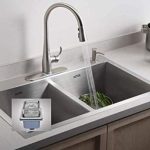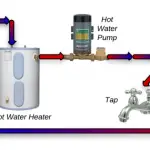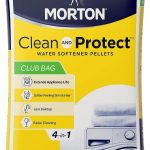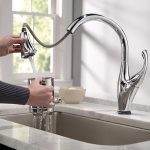High water pressure can be a concern and can result in severe issues with your plumbing system. There are multiple repercussions that can wreak havoc with your plumbing and even with your household appliances. How to fix high water pressure? The tips here should prove to be helpful in providing you a good idea into how to address high water pressure issues.
The easiest way to fix high water pressure is to install a water pressure regulator. If you have already installed a water pressure regulator, you will need to adjust the pressure regulator switch.
Symptoms of High Water Pressure
A few of the symptoms of high water pressure would include pinhole leaks, toilets that keep running continuously, and leakage in the water heaters are a few of the possible symptoms of high water pressure in your plumbing system.

High water pressure can show itself in a variety of ways.
Here are some of the signs of high water pressure –
Banging sound in pipes
The banging sound emanating from the pipes is one of the most common symptoms of high water pressure. It is actually called water hammer. It is heard when a flow of the water suddenly stops. When you close a faucet, the flow of the water is suddenly stopped and this sends a shock wave through the plumbing system.
Leakage in fixtures
Leakage in the fixtures is yet another symptom of the high water pressure. It can even result in a burst of the hoses. Domestic plumbing fixtures do not withstand excessive water pressure. It can even result in pinholes and even create issues inside the wall. A water pressure of more than 80 psi can create problems with your plumbing system.
Failing appliances
If you notice your appliances failing much frequently, it can be due to the high water pressure. You would also notice that the dishwasher floods in your kitchen quite frequently. Leaking water heater can also be a cause of concern and an indication to high water pressure.
How to Test Water Pressure?
Before you can call up your local water expert, make sure that you have checked the water pressure at your home. You can test the water pressure in your locality yourself. You can make use of a water pressure gauge and check the water pressure available at your home.

Testing the water pressure with a pressure gauge is quite easy. Simply screw in the water pressure gauge to the faucet and turn it on fully. Make sure that all the faucets and water connections in your home have been turned off. The reading displayed by your pressure gauge is the exact water pressure available at your home.
As a water expert, let me tell you that the good water pressure that would be enough for most of the appliances and normal usage is 60 psi. Any reading that falls below 45 or 50 PSI is on the lower side and anything that goes above 80 psi is a high pressure. If you are getting any readings above 80 psi, it is evident that the water pressure is above 80 psi.
Rule out the possibility of the citywide pressure issues, and if you are sure that the issue is at your home alone, move on to find how to fix the high water pressure in your home.
How to Fix High Water Pressure in House?
The only way you can fix the high water pressure at your home is to install a water pressure regulator. You will either need to install a new pressure regulator or adjust the existing one if you already have one.
Here are the tools that you need for the purpose:
- Plumbing torch (if working with copper)
- PEX crimping tool (if working with Pex)
- Pipe cutter
- Measuring tape
- Adjustable wrench
- Pipe deburr tool
The materials needed to fix the high water pressure can include:
- Solder (if working with copper)
- CPVC cement (if working with CPVC)
- PEX crimps (if working with PEX)
- Pressure reducing valve
- Thread sealant
- Emery cloth
Here are the steps involved in how to install the water pressure regulator:

- Identify all your parts: The water pressure regulator is installed on the main water line. You would need to install the main water shut-off valve. The most common size is ¾ inch.
- Buy the regulator: Buy the appropriate pressure regulator. Check the compatibility before buying your new regulator
- Turn off water supply: Turn off the main water supply. You can turn it off using the shut off valve or any other means on the main line
- Drain off the water: Open a faucet and drain off all the remaining water in the system.
- Install the fittings: Apply the thread sealant to the fittings and install them on your pressure regulator.
- Cut the pipe to the appropriate size: Use the pipe cutter to cut the pipe to the appropriate length out of the main water line
- Install the fittings on the edges of the pipes: You can apply the relevant fittings on the pipe as per your preferences. You may need to get in touch with your local plumbing expert for the purpose.
- Check the regulator and the arrow: Ensure that the arrow on the pressure regulator is consistent with he direction of the flow. Once you have confirmed, tighten the nut.
- Turn on water: Turn on the water and check if the water pressure has been reduced to the appropriate level now
If you want to adjust the water pressure regulator, you can follow the steps here below:
- Turn off water: Turn off the water supply by means of the shut off valve.
- Loosen the locking nut: Loosen the nut on the regulator. You can use an adjustable wrench for the purpose
- Turn the adjustment screw: Use a screwdriver or the adjustable wrench to help you turn the adjustment screw. You can turn left to decrease the water pressure and turn right to increase the pressure.
- Turn the water pressure back on: Turn on the water pressure. Test the pressure. If the pressure is still high, turn off the water supply and adjust the pressure again.
- Tighten the locking nut
The above Instructions for adjusting water pressure regulator should be helpful in fixing the high water pressure.
Common Causes of High Water Pressure
There can be several reasons that can result in a high water pressure at your home. Some of the issues that can result in a very high water pressure would include:
- High supply pressure: The areas with taller buildings, fire hydrants, and hills, the water pressure may be intentionally set to a higher value. The municipal water supply system in itself may be set at the higher value. This is done to help the water reach the top floor of the building. In most of the cases, these areas are equipped with the water pressure regulator for reducing the pressure and protecting your plumbing system in your home.
- Lower location: If your home is located at the lower location or at the bottom of a hill, it will be natural for it to have a high water pressure. This is primarily due to the force of gravity that can cause the high water pressure.
- Changes in the temperature: The increase in the temperature can invariably result in expansion of the water. This will further increase the water pressure. This can happen – for instance – when your water heater increases the temperature of water. If you have a defective expansion tank, you will experience an issue with the increase in water pressure.
- Faulty water pressure regulator: The faulty or non working water pressure regulator can be one of the reasons that can result in high water pressure in your home. Water pressure regulators are generally likely to have a durability of around 7 to 10 years.
How Pressure Affects Plumbing & Fixtures?
The excessively high pressure can strain your plumbing system and even the appliances such as dishwashers and washing machines. This can perhaps lead you need frequent repairs to the appliances. The high water pressure is also likely to cause a major pipe erosion.
The fixtures and faucets left in the high pressure can leave your plumbing system get their lifespan reduced to a considerable extent. The lifespan of the plumbing system will drastically reduce when compared to the households with the normal water pressure. Some of the common side effects of the high water pressure can include leaking shower valves, leaking faucets, leaking pipes, reduced life span of plumbing appliances like dishwashers and even water heaters.
When explaining the concept of high water pressure to my clients and customers, I always use the analogy of the blood pressure. If you have high blood pressure, your heart needs to work really harder and that way your lifespan is reduced. Even your blood vessels run the risk of bursting (which is called haemorrhage). Scary, eh? Well that is exactly what can happen to your plumbing systems and even your appliances.
Key takeaway:
- 70 PSI: Just above Normal Pressure. This may reduce the Valve Settings
- 80 PSI: Prolonged pressure above these levels may damage appliances.
- 90 PSI: Max rating for most whole-home filtration systems.
- 100 PSI: Max rating for most appliances
The Concluding Thoughts
The high water pressure is one of the major issues that is likely to affect your plumbing system severely. It may be a great experience occasionally to enjoy the high pressure water in your showerhead, but in the long run, it can ruin your plumbing system and can even reduce the efficacy. It may also damage your appliances such as washing machines, dishwashers, water heaters and purifiers. Exercising caution with the high water pressure and taking timely steps to reduce it would be a good idea.











Add Comment